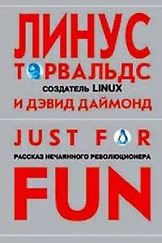Linus Torvalds - Just for Fun
Здесь есть возможность читать онлайн «Linus Torvalds - Just for Fun» весь текст электронной книги совершенно бесплатно (целиком полную версию без сокращений). В некоторых случаях можно слушать аудио, скачать через торрент в формате fb2 и присутствует краткое содержание. Город: NewYork, Год выпуска: 2001, ISBN: 2001, Издательство: HarperCollins Publishers, lnc., Жанр: Программирование, на английском языке. Описание произведения, (предисловие) а так же отзывы посетителей доступны на портале библиотеки ЛибКат.
- Название:Just for Fun
- Автор:
- Издательство:HarperCollins Publishers, lnc.
- Жанр:
- Год:2001
- Город:NewYork
- ISBN:0-06-662072-4
- Рейтинг книги:4 / 5. Голосов: 2
-
Избранное:Добавить в избранное
- Отзывы:
-
Ваша оценка:
- 80
- 1
- 2
- 3
- 4
- 5
Just for Fun: краткое содержание, описание и аннотация
Предлагаем к чтению аннотацию, описание, краткое содержание или предисловие (зависит от того, что написал сам автор книги «Just for Fun»). Если вы не нашли необходимую информацию о книге — напишите в комментариях, мы постараемся отыскать её.
Just for Fun — читать онлайн бесплатно полную книгу (весь текст) целиком
Ниже представлен текст книги, разбитый по страницам. Система сохранения места последней прочитанной страницы, позволяет с удобством читать онлайн бесплатно книгу «Just for Fun», без необходимости каждый раз заново искать на чём Вы остановились. Поставьте закладку, и сможете в любой момент перейти на страницу, на которой закончили чтение.
Интервал:
Закладка:
Regardless, I didn't want to sell Linux. And I didn't want to lose control, which meant I didn't want anybody else to sell it, either. I made that clear in the copyright policy I included in the copying file of the first version I had uploaded back in September. Thanks to the Berne Convention in Europe in the 1800s, you own the copyright to anything you create, unless you sell the copyright. As the copyright owner, I got to make up the rules: You can use the operating system for free, as long as you don't sell it, and if you make any changes or improvements you must make them available to everybody in source code (as opposed to binaries, which are inaccessible). If you didn't agree with these rules, you didn't have the right to copy the code or do anything with it.
Think of yourself. You put six months of your life into this thing and you want to make it available and you want to get something out of it, but you don't want people to take advantage of it. I wanted people to be able to see it, and to make changes and improvements to their hearts' content. But I also wanted to make sure that what I got out of it was to see what they were doing. I wanted to always have access to the sources so that if they made improvements I could use those improvements myself. It made sense to me that the way for Linux to develop into the best possible technology was to keep it pure. If money was to get involved, things would get murky. If you don't let money enter the picture, you won't have greedy people.
While I wasn't interested in asking for money for Linux, other people were not shy about requesting donations whenever they gave someone a copy of the operating system they had loaded onto a floppy disk. By February, it was not uncommon for folks to attend Unix users' meetings armed with floppies containing Linux. People started asking me if they could charge, say, five dollars just to cover the cost of the disk and their time. The trouble was, that was a violation of my copyright.
It was time to rethink my Linux-is-not-for-sale stance. By that point, Linux was getting so much online discussion that I felt fairly confident that nobody was going to be in a position to just take it and run with it, which had been my big fear. At least they wouldn't do it without generating a lot of negative reaction. If anybody tried abducting Linux and turning it into a commercial project, there would have been a strong backlash, and a growing community of hacker types who would say "Hey, that's Linux! You can't do that," although not in such polite words.
The momentum had been established: On a daily basis, hackers from around the world were sharing their suggested changes. We were collectively creating the best operating system around, and couldn't possibly veer away from our trajectory. Because of this, and because Linux had become so recognizable, I felt comfortable allowing people to sell it.
But before I make myself sound like Mr. Beneficent, let me mention another critical element of my decision. The fact is, to make Linux usable, I had relied on a lot of tools that had been distributed freely over the Internet -- I had hoisted myself up on the shoulders of giants. The most important of these free software programs was the GCC compiler. It had been copyrighted under the General Public License, universally known as the GPL (or the "copyleft"), which was the brainchild of Richard Stallman. Under terms of the GPL, money is not the issue. You can charge a million bucks if somebody's willing to pay it, but you have to make sources available. And the person you give or sell the source to has to have all the rights you have. It's a brilliant device. But unlike many hard-core GPL freaks, who argue that every new software innovation should be opened up to the universe under the general public license, I believe it should be the right of the individual inventor to decide what to do with his or her invention.
So I dumped my old copyright and adopted the GPL, a document that Stallman had written with lawyers looking it over. (Because lawyers were involved, it runs on for pages.)
The new copyright was included in version 0.12, but I remember lying awake at night after releasing it, nervous about what commercial interests would do to the system. Looking back now, it seems ridiculous to have been so worried because the commercial interest was relatively small. Something made me think that I had to be careful. One of my worries was -- and still is -- that somebody would just take Linux and not honor the copyright. Back then I worried that it would be practically impossible to sue anyone in the United States who broke the copyright. It's still a concern. It's easy to prosecute someone for such violations, but I worry about somebody doing it until they're forced to stop.
And there are nagging fears that companies in places like China won't honor the GPL. Practically nothing in their legal system prevents them from breaking the copyright, and in a real sense it's not worth the trouble to go after people who would try to do something illegal. That's what big software companies and the music industry have tried to do and it hasn't been overwhelmingly successful. My fears are mitigated by reality. Somebody might do it for awhile, but it is the people who actually honor the copyright, who feed back their changes to the kernel and have it improved, who are going to have a leg up. They'll be part of the process of upgrading the kernel. By contrast, people who don't honor the GPL will not be able to take advantage of the upgrades, and their customers will leave them. I hope.
Generally speaking, I view copyrights from two perspectives. Say you have a person who earns $50 a month. Should you expect him or her to pay $250 for software? I don't think it's immoral for that person to illegally copy the software and spend that five months' worth of salary on food. That kind of copyright infringement is morally okay. And it's immoral -- not to mention stupid -- to go after such a "violator." When it comes to Linux, who cares if an individual doesn't really follow the GPL if they're using the program for their own purposes? It's when somebody goes in for the quick money-that's what I find immoral, whether it happens in the United States or Mrica. And even then it's a matter of degree.
Greed is never good.
X. Minix vs. Linux
The attention wasn't all positive. Although confrontation never has been my best sport, I was bullied into defending Linux and my manhood when Andrew Tanenbaum kept making attacks on the operating system that was supplanting his own. We're nerds, so it was all done via email.
Who could blame him for getting hot under the T-shirt? Before any Linux newsgroups had been created, I routinely used Minix newsgroups to make announcements about Linux or find people who were interested in the operating system. Why should Andrew like that?
So, for starters, he was unhappy about my infringing on his newsgroup. And he obviously wasn't too pleased that his operating system was becoming eclipsed by this new creation from the snowy wilds of Finland -- and that so many developers were joining the project. He also had opposing ideas for how operating systems should be built. At the time, Andrew was part of a camp of computer scientists who favored the microkernel approach to operating systems. He had done Minix as a microkernel, and Amoeba, the system he was working on at the time, also involved one.
This was a flourishing movement in the late 1980s and early 1990s. And Linux's success was threatening it. So he kept posting unpleasant little jabs.
The theory behind the microkernel is that operating systems are complicated. So you try to get some of the complexity out by modularizing it a lot. The tenet of the microkernel approach is that the kernel, which is the core of the core of the core, should do as little as possible. Its main function is to communicate. All the different things that the computer offers are services that are available through the microkernel communications channels. In the microkernel approach, you're supposed to split up the problem space so much that none of it is complex.
Читать дальшеИнтервал:
Закладка:
Похожие книги на «Just for Fun»
Представляем Вашему вниманию похожие книги на «Just for Fun» списком для выбора. Мы отобрали схожую по названию и смыслу литературу в надежде предоставить читателям больше вариантов отыскать новые, интересные, ещё непрочитанные произведения.
Обсуждение, отзывы о книге «Just for Fun» и просто собственные мнения читателей. Оставьте ваши комментарии, напишите, что Вы думаете о произведении, его смысле или главных героях. Укажите что конкретно понравилось, а что нет, и почему Вы так считаете.












